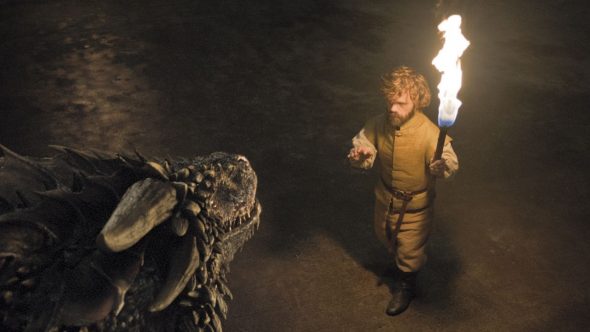This year, we’re going to be putting our day-after observations about Game of Thrones into writing instead of a recap podcast, in a series we call Game of Thrones Unlocked. In keeping with our tradition, these will focus on explicating one scene as an interpretive key for unlocking deeper interpretations of the episode’s themes. These articles will contain spoilers through he episode under discussion. This week, Ben Adams tackles “Home” (S6 E2).
Subversion of expectations is the engine that has turned Game of Thrones into the powerhouse that it is. From the death of Ned Stark to the Red Wedding to that moment when you realize that Tyrion is the closet thing the series has to a protagonist, Game of Thrones makes its money on its ability to confound the expectations of the audience: you thought that guy was the hero? Well, off goes his head. You thought that guy was the hero? Well, Tywin Lannister sends his regards.
But just like jazz is all about the notes you don’t play, Game of Thrones is all about the stabbings that don’t happen. Because just as often as we are surprised by a sudden death or battle, Game of Thrones pulls away at the last minute, sparing us the battle that seems imminent. And that’s a vitally important part of what makes the narrative tick. You can’t have sudden deaths all the time, or they cease to be surprising. Unexpected life is just as important as unexpected death.
“Home” plays out this tension in a variety of ways. The first half of the episode is mostly filled with unexpected reprieves from death: at the Wall, the Wildlings take Castle Black (mostly) without blood being shed, despite the heavily armed camps on both sides. In King’s Landing, Ser Robert Strong (the Zombie Knight) looks like he’s going to have to cut down a dozen guardsmen, but Cersei decides to back down. Jamie decides not to kill the High Sparrow, and even Dany’s dragons decide that they’ve got a friend in Tyrion.
These moments are important because they remind the audience that despite the hype, Game of Thrones is about more than summary executions. Character development happens in these liminal spaces, where there is a real choice between fighting or retreating for another day: in their individual decisions not to fight, we learn something about Allister Thorne, Cersei, Jamie and the dragons.
But of course, this is just a setup for the carnage that is to come. These scenes all serve to teach us exactly the wrong lesson. Because it turns out there’s really nothing more to learn about Ramsay Bolton: he is exactly as much of a monster as we thought, and if you really believed that he was going to let a tender moment between father and son pass without bloodshed, Mr. Weiss and Mr. Beinoff send their regards.
Taken together, these scenes have an interesting effect on our perception of the confrontation between Lord Balon Greyjoy and his younger brother, Euron Greyjoy, on the bridges of Pyke. As far as I recall, we have not been previously introduced to Euron in the TV series, so this introduction, at the end of a rickety bridge in a blustering storm, is where we will learn what kind of man he is. The previous scenes in the episode have shown us that the confrontation could go either way—maybe he’ll throw him off the bridge, or maybe he’ll just let him pass. When he makes his choice, we learn that Euron is a card carrying member of the Ramsay Bolton School of Leadership.
**WARNING: The Net Is Dark And Full Of Spoilers**
Of course, all of this leads up to the final moment of the episode, and the scene we’ve all been waiting for. It is hard to think of a moment in recent TV history that has been as anticipated, speculated, rumored, theorized, and obsessed over than the final shot of “Home” with Jon Snow opening his eyes and coming back to life. The actor who plays Jon, Kit Harrington, god bless him, has spent the last year trying to insist that what we think is going to happen isn’t going to happen. And of course no one believed him.
So with all the speculation, the challenge of “Home” was to convince us that maybe, just maybe, Jon really wasn’t going to come back (or at least not yet). The entire 55 minute run-time up until that point is an exercise in building and confounding expectations, demonstrating that every moment in the series really does ride on a knife’s edge: the Wildlings and Night’s Watch may fight, or not; Robert Strong may kill 12 guardsmen at Cersei’s orders, or not; a girl may be Arya Stark, or not; the dragons may eat Tyrion, or not; Ramsay Bolton may hug his father without stabbing him, or not (OK, he’s totally going to stab him); and Euron Greyjoy may let Balon pass over the bridge, or not.
Even a moment as shocking as Ramsay Bolton and his dogs devouring a 1-hour-old baby is just a prelude to the Red Woman saying a prayer over the body of a freshly-dead Lord Commander. The episode (and the series as a whole) has trained us to wonder what’s going to happen next; to wonder whether our expectations are really going to be fulfilled.
And as Davos and Mellisandre and all the rest of the onlookers start to drift away, one by one, we start to think that maybe, just maybe, Jon Snow is going to stay dead (at least for now).
Only death can pay for life. That’s the way that magic works on Game of Thrones: to make life, you need death. But that’s also the way the narrative works: by balancing the scales of life and death, the story keeps us guessing, and coming back for more.
What was your key scene in this episode? Let us know in the comments below

